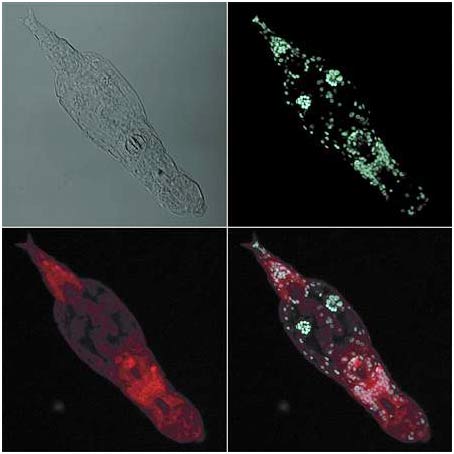Animals fast sex ... 40 million years
A small group of Earth's inhabitants survived without caring about " love " for tens of millions of years, thanks to a sophisticated evolutionary trick.
Asexual reproduction has allowed these single-celled organisms ( bdelloid rotifers ) to produce different gene copies over time, helping them adapt and survive, the researchers claim.
Previous researchers have also shown that translucent animals that live in this water can survive up to 40 million years without bisexual mating. The question is, how do they survive without gene exchange through mating.
"Bisexual reproduction is considered to be a good thing in evolution. So when you encounter a creature like bdelloid rotifers, animals don't crave" love "in millions of years, you will start to suspect why sex is important " - said Alan Tunnacliffe, a molecular biologist at Cambridge University.

Bdelloid rotifers specialize in lakes. They create different gene copies to survive and evolve. (Photo: Reuters)
All animal species and bisexual plants have nearly identical pairs of genes, one from father and one from mother. And so, there must always be two opposite sexes to reproduce the younger generation. But when studying with molecular cloning technology, Tunnacliffe found that bdelloid rotifers overcome this with an evolutionary trick, allowing its genes to drift apart and evolve themselves.
"No sex means that genes can evolve in different directions. It's like you have a bigger gene pool, which makes it easier to choose for different functions."
T. An
- Sponge fossils 600 million years
- The earliest footprint of animals
- Animals that can 're-grow limbs' appear 300 million years ago
- The Ruc still eat rats 'extinct 11 million years ago'
- Animals appear first on Earth
- Mysterious animals 'stop sex' 80 million years
- Colombian boy goes out, finds fossil 90 million years old
- Detects animals they are 12 million years old with many modern facial features
- All information about BRT express bus
- Found blood cells in dinosaur fossil foundations of 75 million years
- 'Great extinction' used to happen on Earth
- FAST telescope is being threatened by Chinese people
 Why do potatoes have eyes?
Why do potatoes have eyes? 'Tragedy' the world's largest carnivorous life: Death becomes ... public toilet
'Tragedy' the world's largest carnivorous life: Death becomes ... public toilet Tomatoes were once considered 'poisonous' for 200 years
Tomatoes were once considered 'poisonous' for 200 years Detecting microscopic parasites on human face
Detecting microscopic parasites on human face Gene discovered that makes it easier to have a baby girl
Gene discovered that makes it easier to have a baby girl  Gene discovered that causes rare genetic eye disease
Gene discovered that causes rare genetic eye disease  China built a 'gene bank' of ancient ceramics
China built a 'gene bank' of ancient ceramics  Why can humans talk but apes can't?
Why can humans talk but apes can't?  Scientist is shocked when an experiment accidentally causes hamsters to 'change their behavior'
Scientist is shocked when an experiment accidentally causes hamsters to 'change their behavior'  For the first time successfully performed parthenogenesis in mice
For the first time successfully performed parthenogenesis in mice 